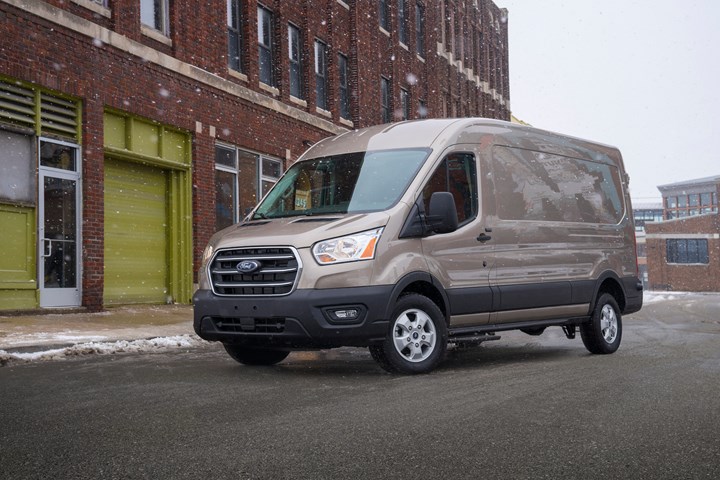NCC, Ford partner to lightweight Ford Transit van
The award-winning CHASSIS project aims to lightweight three van components, a step toward reduced emissions and affordable mainstream autocomposites.

2020 Ford Transit cargo van
Photo Credit: Ford Motor Co.
A project to lightweight Ford Motor Co.’s (Brentwood, U.K.) Ford Transit vans, involving partners ( Newton Aycliffe, U.K.), the (NCC, Bristol, U.K.) and the University of Nottingham, has been awarded the at the Composites UK Industry Awards 2020.
The project, part of Ford’s Composite Hybrid Automotive Suspension System Innovation Structures (CHASSIS) program, aimed to reduce the weight of three components in the Ford Transit: the front suspension crossmember, front lower control arm and rear deadbeam axle. The result, the NCC reports, was an average weight reduction across the components of 40% at an affordable cost target, representing more than 30 kilograms of weight saving from the current steel components.
The CHASSIS consortium was developed to be a multi-material solution to provide affordable weight savings for mass production volumes. CHASSIS is based on Ford’s CLASS project, which was the recipient of the 2018 JEC World Automotive Application Innovation Award.
According to the NCC, the CHASSIS project will have a significant impact on the delivery of composite components to the mainstream automotive industry, resulting in sufficient cost reductions for volume production. When deployed, the hybrid material technology being delivered for the Transit program will, the NCC says, reduce emissions by 0.6% with a corresponding improvement in fuel economy, paving the way for subsequent emerging technology.
“We’re delighted that this project has been recognized for its innovation — it is another step closer to us achieving a goal for net zero transportation,” says Ed Goodman, director of emerging markets at the NCC. “To hear the news on the day the U.K. government launched its Ten Point plan for a Green Industrial Revolution, which will see only electric and hybrid vans on sale in the U.K. from 2030, is apt and demonstrates how important R&D in this area is.”
Related Content
-
Sinonus launches energy-storing carbon fiber
Swedish deep-tech startup Sinonus is launching an energy-storing composite material to produce efficient structural batteries, IoT devices, drones, computers, larger vehicles and airplanes.
-
Al Seer Marine, Abu Dhabi Maritime unveil world’s largest 3D-printed boat
Holding the new Guinness World Record at 11.98 meters, the 3D-printed composite water taxi used a CEAD Flexbot to print two hulls in less than 12 days.
-
Natilus announces Horizon blended wing body CFRP aircraft for 200-passenger narrowbody market
Following its Kona cargo aircraft with 460 pre-orders, this larger all-CFRP model responds to airlines’ request to fill Boeing and Airbus gap with 25% less weight, 40% greater capacity and 50% less carbon emissions, to enter service by early 2030s.
.jpg;width=70;height=70;mode=crop)





